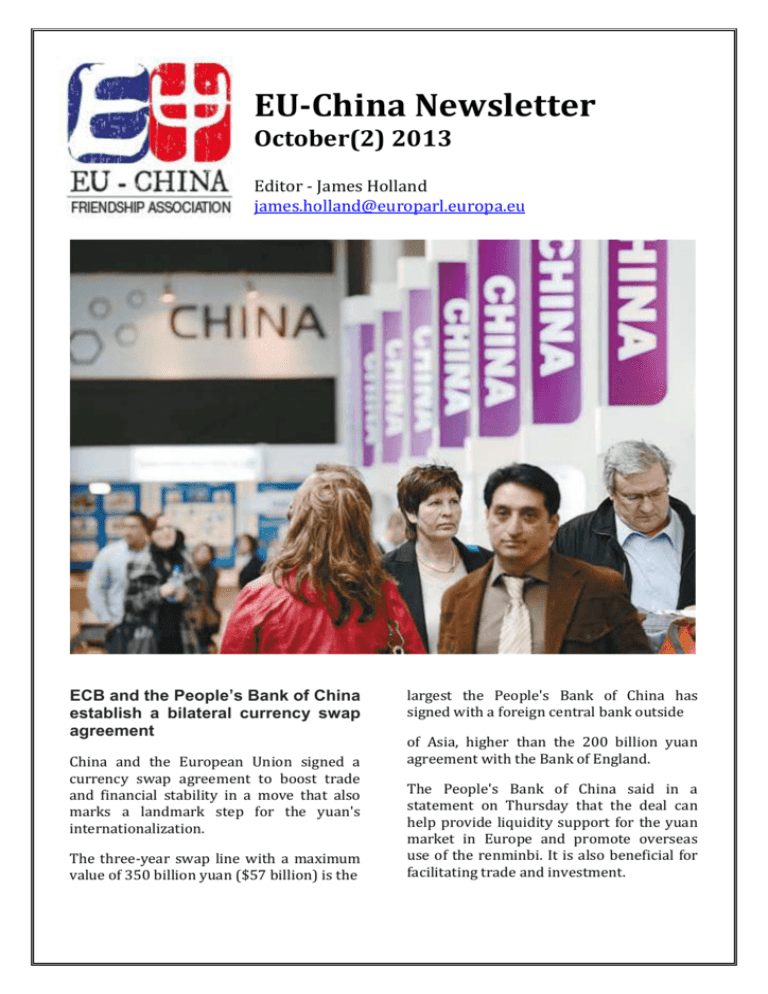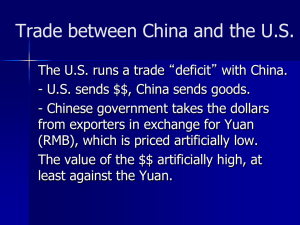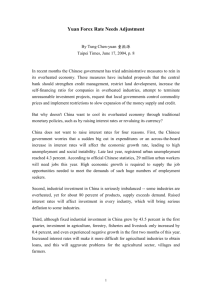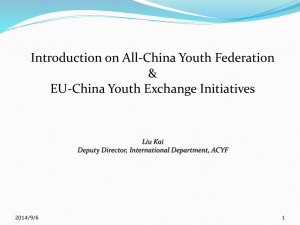EU-China Newsletter
advertisement

EU-China Newsletter October(2) 2013 Editor - James Holland james.holland@europarl.europa.eu ECB and the People’s Bank of China establish a bilateral currency swap agreement China and the European Union signed a currency swap agreement to boost trade and financial stability in a move that also marks a landmark step for the yuan's internationalization. The three-year swap line with a maximum value of 350 billion yuan ($57 billion) is the largest the People's Bank of China has signed with a foreign central bank outside of Asia, higher than the 200 billion yuan agreement with the Bank of England. The People's Bank of China said in a statement on Thursday that the deal can help provide liquidity support for the yuan market in Europe and promote overseas use of the renminbi. It is also beneficial for facilitating trade and investment. Experts said that the agreement with the European Central Bank is a significant step forward for the internationalization of the yuan and is a reflection of the increasing demand for the Chinese currency in financial transactions in the eurozone. agreement as France has been keen on developing its capital into a major yuan trading center. Yuan deposits in Paris amount to 10 billion yuan, making the French capital the secondlargest pool for the Chinese currency in Europe after London. Nearly 10 percent of Sino-French trade is settled in yuan, according to the French central bank. "The amount of the currency swap is significant, and it is an important step to develop the renminbi transactions in the euro area," said Philippe Mongars, deputy director of the market operation department at the Bank of France. Michael Moore, a professor of Finance at Warwick Business School in the UK, said that the swap reflects China's ambition to raise the international profile of its currency. "All the banks based in the euro area will benefit from it and we see it as a backstop to maintain confidence in the Chinese currency in the euro area," he said. "If China's aim is to make the yuan an international currency of choice, this is a good start," he said, noting that both sides need to replenish the deal to meet market demand. "What is also important to bear in mind is that the arrangement is bilateral so it is also a reassurance for banks in China when they need to access the euro," he added. Since 2008, China has signed currency swap agreements with 23 regions and countries with the total value reaching 2.48 trillion yuan, according to the People's Bank of China. The European Central Bank said in a statement that the agreement has been established in the context of rapidly growing trade and investment between the eurozone and China. The swap is intended to serve as a backstop facility to ensure the yuan's liquidity and financial stability in the eurozone. EU-CHINA NEWS "The agreement showed that the ECB is very interested in contributing strongly to the internationalization of the renminbi," said Arnaud de Bresson, chief executive of Paris Europlace, a professional association that promotes Paris as an international financial center. National Day Reception On September 25th, the Chinese Mission to the EU and the Embassy of China to Belgium cohosted a reception in celebration of the 64thanniversary of the People’s Republic of China. More than 800 guests attended the event, including visiting Vice Chairman Ji Bingxuan of the Standing Committee of Chinese National People’s Congress, Chief Operating officer David O’Sullivan of the EEAS, President Andre Flahaut of Chamber of Representatives and Belgian Deputy Prime Minister Alexander De Croo. De Bresson said that the swap is likely to significantly boost the yuan-denominated bond market in Europe and will help consolidate Paris' position as a major platform for yuan trading and transactions in the eurozone. Paris played a leading role in pushing the European Central Bank to sign the -2- EU-China Friendship Association relationship has matured and become more sustainable. We have boosted our win-win cooperation and put it on a much more solid footing. Cultural exchanges between China and EU have strengthened mutual understanding between our peoples. We are encouraged by Europe's nascent economic recovery, which will provide ever more opportunities for future cooperation. I am fully confident that we can continue to enhance our cooperation in a spirit of mutual respect and benefit, as we recently did in our joint efforts to overcome friction relating to solar panels. Address by H.E. Ambassador Wu Hailong at the Reception for the 64th Anniversary of the People's Republic of China Your Excellencies, Ladies and Gentlemen, It is my pleasure to welcome you all to the Chinese Mission to celebrate our National Day with us. This evening we are honored to have with us H.E. Ji Bingxuan, Vice Chairman of the Standing Committee of Chinese National People's Congress, H.E. Andre Flahaut, President of Chamber of Representatives of Belgium and H.E. , Deputy Prime Minister of Belgium. I would like to extend our special thanks to them for their presence. Ladies and Gentlemen, Over the next few months, there will be a number of important events for our bilateral relations, including the High-Level Economic and Trade Dialogue, the Strategic Dialogue and the China-EU Summit. Our leaders will work together to chart the course for future cooperation in urbanization, environmental protection, green growth and many other important areas. They will identify synergies between China's "12th five year plan" and Europe's "2020 strategy" and hopefully launch negotiations on a China-EU investment agreement. Looking forward, I am confident that our strategic partnership will grow ever stronger and more resilient in the upcoming decade. I also trust that our friends, present here this evening, will continue to help us in this venture, and I thank you warmly for all of your support. Let me conclude by proposing a toast, In March this year, a new leadership took office in China, which has continued to advance reforms and opening up in China, rallying the people in pursuit of the "Chinese Dream" – a dream of national renewal and better lives for the Chinese people. Our economy has performed well over this period, with GDP growing by 7.6% in the first two quarters. We are confident to meet our 2013 growth target. At the same time, the Chinese government is prioritizing transforming the country's growth model and restructuring the economy. These innovative reforms will help unlock the potential of domestic demand, re-energize our market and upgrade China's economy. Although China remains a developing country, as its economy continues to grow, it will contribute more and more to global peace and prosperity. We are more than willing to share the enormous opportunities that China's development represents, with the rest of the world. To the 64th Anniversary of the People's Republic of China, To the prosperity of China,Belgium and the EU, To the happiness of our peoples, and This year marks the 10th anniversary of China-EU comprehensive strategic partnership. Over the past decade, our To the health of our guests here. Cheers! -3- EU-China Friendship Association Ambassador Wu Hailong’s Interview with the Diplomatic World Now, our relations are well positioned to achieve even greater development. Over the next decade, we should think creatively, set new goals for our relations and unleash the full potential of our cooperation for global peace and development. Q: This year marks the tenth anniversary of the establishment of a Comprehensive Strategic Partnership between China and the EU. What have been the main highlights of the partnership over the past ten years? And what are your expectations for the next decade? I believe we should prioritize the following three aspects: Firstly, providing mutual support. China and the EU should seek to understand and support each other’s respective development paths, accommodate the differences in political and social systems and respect each other’s major concerns and interests. If we can complement each other, we can better contribute to world peace and development. A: A decade ago, China and the EU established the Comprehensive Strategic Partnership. Since then, the two parties have gone beyond their differences in history, culture and social systems, overcome the challenges of an everchanging world and substantially deepened their relations. As a result, bilateral relations have grown more mature. We have set up a multi-tiered cooperation framework, with an annual Summit, highlevel strategic, economic and people-topeople dialogues and over 60 other mechanisms. Both sides have put their mutually beneficial relations on more solid footing and scaled up cooperation. The EU has been China’s biggest trading partner for the past 9 years. Defying the sluggish world economy last year, bilateral trade reached US$546 billion, a four-fold increase as compared to a decade ago. Our people-topeople exchanges have helped mutual understanding. The two sides have hosted a series of cultural events around “thematic years”. Last year, over 1.5 million Chinese chose EU countries as the first stop in their overseas travel. There are over 70 flights between China and Europe every day. We have enhanced mutual understanding and coordination in an effort to address climate change, improve global governance, promote sustainable development and manage regional hotspots. Secondly, intensifying our comprehensive cooperation. We should be thinking out of the box, to upgrade economic cooperation and expand mutual investment, with a focus on urbanization, energy, environmental protection, science, technology and innovation. We should also deepen cooperation on multilateral and bilateral platforms, through governmental and nongovernmental channels as well as regional and sub-regional mechanisms. Thirdly, striving for mutual growth and prosperity. China and the EU are increasingly inter-dependent. It is essential to deepen and expand cooperation, making concerted efforts to boost growth and further our common interests so that our people can benefit from our common development and prosperity. Q: Trade between China and the EU is on the decline this year. Is this a consequence of trade friction between the two over solar panels, which has aroused global attention? What is the future for China-EU trade? A: Trade underpins our comprehensive strategic partnership and is the most -4- EU-China Friendship Association dynamic and promising aspect of bilateral relations. Amid global economic downturn, the volume of China-EU trade declined. Yet it remains so large that trade frictions will perhaps inevitably arise. The key is to upgrade our cooperation in a constructive manner, settle trade disputes through dialogue and consultation and refrain from resorting to trade remedy measures, which in the end only harm both sides. The European Commission and Chinese solar exporters have reached a settlement of solar panels dispute, and China welcomes this agreement. I hope we will continue to resolve any trade frictions in a positive, amicable, practical and flexible way so as to create positive conditions for our further economic cooperation. modernization, and thus to take our economic ties to a higher level. Q: China and the EU have differences of opinion on human rights and various other issues. Does this affect mutual trust between the two? You have written an article, calling on the EU to enhance mutual trust with China. Do you believe that the lack of trust undermines this relationship? A: Mutual trust is the foundation of ChinaEU relations. I once wrote in an article that a high level of mutual trust is essential for steady and sustained bilateral relations. Leaders of both sides share the same aspiration of strengthening mutual trust. Our bilateral relations cannot develop smoothly without sufficient trust. China and the EU differ in histories, cultures and in the stage and path of development, so it is natural for us to have different views and perceptions on certain issues. We should handle these differences in a spirit of mutual respect, equality and understanding. We cannot make progress on our comprehensive strategic partnership unless we take an objective, comprehensive and sensible approach and dispel mutual suspicion and misgivings through dialogue and cooperation. Given the fast-changing economic landscape, China and the EU are advancing their cooperation within a complex international context. As the most important emerging economy and the biggest grouping of developed countries, China and the EU are both at important stages of development. Both have huge markets and great potential. With comparative advantages, the two sides have much to offer each other in the fields of science, technology, investment and urbanization. As long as China and the EU can seize these opportunities in a spirit of mutual respect and expand cooperation, our economic ties will make new strides. Over the next five years, China is estimated to import US$10 trillion worth of goods and invest US$500 billion overseas. Over 400 million Chinese will travel abroad. This represents immense opportunity for Europe. I hope that the EU and China will work together to launch as soon as possible negotiations on an investment agreement and agree a long-term plan for our strategic cooperation. China is ready to extend cooperation with the EU to the fields of new industrialization, IT application, urbanization and agricultural Q: People-to-people exchanges have become the third pillar of China-EU relations. Can you share with us the achievements that have come from these cultural, educational and youth exchanges? A: China and Europe, both ancient civilizations, have so much to offer each other by means of cultural exchanges. In 2012, the two sides launched the HighLevel People-to-People Dialogue, giving strong impetus to the exchanges. In the field of culture, the Chinese Ministry of Culture alone has sponsored almost one hundred cultural exchange programmes in -5- EU-China Friendship Association Europe. In recent years, China has been invited as guest of honour to the wellknown Europalia International Arts Festival in Brussels and the Frankfurt Book Fair in Germany. The China-EU High-Level Cultural Forum has become a regular feature of our cultural exchanges. Last year’s China-EU Year of Intercultural Dialogue launched nearly 300 cooperation programmes. Bilateral cultural centers are flourishing. negotiation processes. They have worked together in the G20 and IMF to help progress reforms to the international financial system and global governance. China and the EU have intensified dialogue and consultation on safeguarding energy and food security and achieving the MDGs, and have helped promote mutual NorthSouth understanding and development. The two sides also consult regularly on the Middle East affairs and the Iranian nuclear issue, and are working together to fight piracy and ensure safe navigation through the Gulf of Aden and the seas off the Somali coast. In the field of education, the EU member states represent a major destination for Chinese students and scholars studying abroad. There are 200,000 Chinese studying in Europe and 30,000 Europeans studying in China. China has academic mutual recognition agreements with 14 EU member states, including the UK, France, Germany, Italy and the Netherlands. Chinese universities have offered courses of all of the 24 official EU languages. The number of Confucius Institutes in Europe is also increasing. In today’s world, global challenges such as financial crisis, strained resources, climate change, nuclear security and terrorism, cannot be resolved by any single country or region. It is imperative for China and the EU to work together, strengthen communication and support each other in making our due contribution to safeguarding and promoting world peace and development. In the field of youth exchange, activities of the China-EU Year of Youth held in 2011 were attended in person by more than 10,000 young people from China and the EU, while 160,000 more participated through new media. The two sides have maintained good cooperation in youth entrepreneurship, volunteer services, development and the protection of youth rights. Q: It is argued that the sovereign debt crisis has weakened the EU’s position and role in the world. How does China see Europe today? A: As one of the largest economies in the world, the EU takes the lead in science and technology, managerial expertise and innovation. When Europe encountered challenges in recent years, people became pessimistic of its future. Some critics exaggerated the risks of EU disintegration and talked about the collapse of euro. But China has remained confident in the EU and supported the EU throughout the debt crisis. China believes that the economic and social development of the EU will be reenergized following fiscal consolidation and structural reform. Growth and jobs will return. China also believes that the EU remains an important player in the world and is indispensable for battling global and Q: Both China and the EU are important players in the global arena. How can China and the EU better cooperate in global affairs and work together to tackle regional hot spot issues? A: China and the EU, as important global players, share common interests and similar views on many global and regional issues and carry out extensive coordination and cooperation in this field. The two sides have enhanced consultation on climate change and facilitated progress in relevant -6- EU-China Friendship Association regional challenges. The EU plays an important role in facilitating and liberalizing global trade and investment, resisting protectionism and improving global governance. years to build to meet international standards. The pilot zone is a crucial move in adapting to global economic and trade development and imposing a more proactive opening-up strategy, said the statement, adding it will help explore a new path for China's opening up, speed up transformation of government functions and promote economic restructuring. China places great value on the EU and regards it as an important “pole” in a multipolar world. China prioritizes its relations with the EU in its foreign policy. To advance industrialization, IT application, urbanization and agricultural modernization, China needs more European products, investment, managerial expertise, science and technology. The transformation of development model will help to expand China’s domestic consumption, boost its imports from and investment in Europe, which will translate into new opportunities for European industries and contribute to growth and jobs in Europe. The zone will also help foster China's global competitiveness and serve as a new platform for the nation's cooperation with other countries, and contribute to efforts in building "an upgraded version of China's economy," said the statement. Besides, China will adopt a "negative list" approach in the foreign investment management in the zone, and innovate the country's opening-up mode, said the statement. CHINA NEWS Zhu Jianfang, chief economist at Citic Securities, said the "negative list" approach, which the zone will adopt, showed a thinking of power delegation. China builds pilot free trade zone to further open up "We can no longer rely on preferential policies to improve business and the investment environment. Rather, we should attract investment with highly efficient and transparent administrative services," said Zhang Youwen, an economic researcher at the Shanghai Academy of Social Sciences. China's State Council has approved the establishment of a pilot free trade zone in Shanghai, according to a Ministry of Commerce statement. The general development plan is to be decided in midSeptember and the zone will be formally set up by the end of September. In the free trade zone, the reforms featuring power delegation will be deepened, and financial, business, cultural, education and medical services, which faced many restrictions before, are expected to enjoy more development opportunities, analysts said. Covering 28.78 square kilometers, The Shanghai free trade zone will be built on the basis of existing bonded zones -Waigaoqiao Free Trade Zone, Waigaoqiao Free Trade Logistics Park, Yangshan Free Trade Port Area and Pudong Airport Comprehensive Free Trade Zone. Experiments in the financial sector will be the most important part, such as the marketization of interest rates and exchange rate, and offshore finance, said Xu The zone will be the first of its kind on the Chinese mainland. It will take about three -7- EU-China Friendship Association Quan, deputy head of the Shanghai Municipal Office of Finance Service. Aside from Tianjing, other cities, such as Guangzhou, Shenzhen, Chongqing, Xiamen, Qingdao, and Zhoushan, were also planning to apply for the establishment of free trade zones. Meanwhile, a State Council plan to suspend some laws governing foreign investment in the Shanghai pilot free trade zone will break new ground in China's investment management mechanism and boost foreign capital inflow, said analysts. As for this momentum, experts suggest that the set up of any other free trade zone should follow scientific planning and rational overall arrangement, other than advancing too quickly. The aim is to cancel superfluous administrative procedures and make it easier for foreign firms to set up in the zone. The plan conflicts with some existing laws so the idea was mooted to simply suspend the problematic regulations. Have yuan, will travel far and wide The rising value of the yuan has had a curious side effect: It is often cheaper for Chinese tourists to travel to exotic foreign destinations than it is to travel to China's popular resorts. "The free trade zone is not a special zone or new area. Its significance lies not in striving for preferential policies but in establishing a new system in line with international standards and realizing highly efficient management in sectors like investment and trade," said Zhou Zhenhua, director of the Shanghai Municipal Government Development Research Center. A Beijing resident looking for an island break, for example, may find it more economical to go to Sri Lanka than to Hainan. Over the next year, the number of outbound trips from China will top the 100 million mark for the first time in history. The rising number of Chinese people traveling abroad has grown even faster than predicted. The UN World Tourism Organization (UNWTO) had expected China to hit this particular milestone in 2020. This growth will further cement the position of Chinese tourists as the biggest global spenders, ahead of tourists from the US and Germany. China has rapidly grown into a global manufacturing power with its entry into the World Trade Organization, but the country remains relatively backward in service industries like financing, shipping, commerce, trade and culture, compared with developed nations, experts said. Shanghai is leading the country in service industry development and the further opening up of the sector is the best choice for the city, according to Chen Bo, an economic and trade expert at Shanghai University of Finance and Economics. The main driver of this growth in spending is the rising demand for international travel, particularly self-organized trips to destinations in places such as Africa and the smaller European or Asian countries that are increasingly reaching out to Chinese tourists. As Shanghai was announced to build China's first free trade zone, more Chinese cities are planning to pilot free trade zone so as to enjoy the policy dividends. "Barring wild-card events, China's outbound travel market will increase by 17 percent, the same rate as has been reported for the first five months of 2013," said Wolfgang Georg Arlt, director of the China Northern China's port city Tianjin is planning to set up a free trade port in its Dongjiang bonded port. -8- EU-China Friendship Association Outbound (COTRI). Tourism Research Institute The China Outbound Tourism Index, which is produced by COTRI monthly, dropped slightly in August from a month earlier, but the performance over the last year has been higher than a year earlier. Read more Eu-China Friendship Association info@eucfa.net Do you want to stay updated? Subscribe to our newsletter by sending us an email Changed Your Mind? You can easily cancel your free e–newsletter at any time. Just send us an email to unsubscribe. Do you know someone who would be interested in reading this? Forward this page to her/him! -9- EU-China Friendship Association







